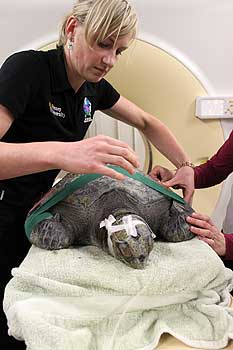TOP STORIES
What is making swans sick?
Dr. Geoffrey Gardner, a Lakeland swan expert, is facing the challenge of a lifetime. Something is killing the seabirds and swans on Long Boat Key, and he has to find out what it is.
"Our concern is that it may be coming from toxins in the waters, something coming from the dispersants that might have been used for the Gulf oil spill," Gardner told FOX 13 on Thursday.
FOX 13 News - www.myfoxtampabay.com
K Suarez
23 Sept 2010
Photo courtesy of FOX 13 News
Location: Longboat Key, Florida, USA - Map It 

Wildlife vets tend wayward turtle
A female green sea turtle is being cared for at the University’s Wildlife Health Centre after being found on Otaki Beach.
The species of turtle is usually found in tropical waters, with Australia’s North Queensland coast its closest known habitat.
Wildlife vet Kerri Morgan says it appears the turtle became sick and was caught in a current. “It’s unusual for them to venture this far south,” she says. “The cold New Zealand water has given this turtle what we call ‘cold shock’, and we’re now doing what we can for her.
Massey University - www.massey.ac.nz
24 Sept 2010
Photo courtesy of Massey University
Location: Otaki Beach, Wellington, New Zealand - Map It 

Deadly illness still spreading among bighorns
State wildlife biologists made the gut-wrenching decision last spring to kill dozens of sick bighorns west of the Yakima River Canyon in hopes of keeping a pneumonia outbreak from reaching the herd across the river.
It didn't work. Roughly two-thirds of the lambs born this spring east of the canyon are believed to have died.
And although biologists haven't verified deaths among the adults, hunters on a special-permit hunt on that side of the river last week reported seeing adult rams coughing.
Yakima Herald-Republic - www.yakima-herald.com
S Sandsberry
18 Sept 2010
Location: Washington, USA - Map It 

Reported Wildlife Mortality Events to the USGS National Wildlife Health Center Updated
USGS and a network of partners across the country work on documenting wildlife mortality events in order to provide timely and accurate information on locations, species and causes of death. This information was updated on September 23, 2010 on the USGS National Wildlife Health Center web page, New and Ongoing Wildlife Mortality Events Nationwide. Quarterly Mortality Reports are also available from this page. These reports go back to 1995.
USGS National Wildlife Health Center
24 Sept 2010
Area: United States
OTHER WILDLIFE HEALTH RELATED NEWS
Photo credit: Biosphoto/SpecialistStock/Barcroft - The week in wildlife [image gallery]
- Coral bleaching likely in Caribbean this year
- Cash now, save life tomorrow, says IUCN [biodiversity conservation]
- More Predators Doesn't Equal More Danger for Urban Bird Nest, Study Finds
- Hybrid Panthers Helping Rare Cat Rebound in Florida [Florida, USA]

- Minn. officials on lookout for bat-killing disease [Minnesota, USA]
- Boulder closes open space areas due to mudsnails, white-nose syndrome [Colorado, USA]
- Cave bats on threatened list [Wisconsin, USA]
Degrading Water Quality and Wildlife







